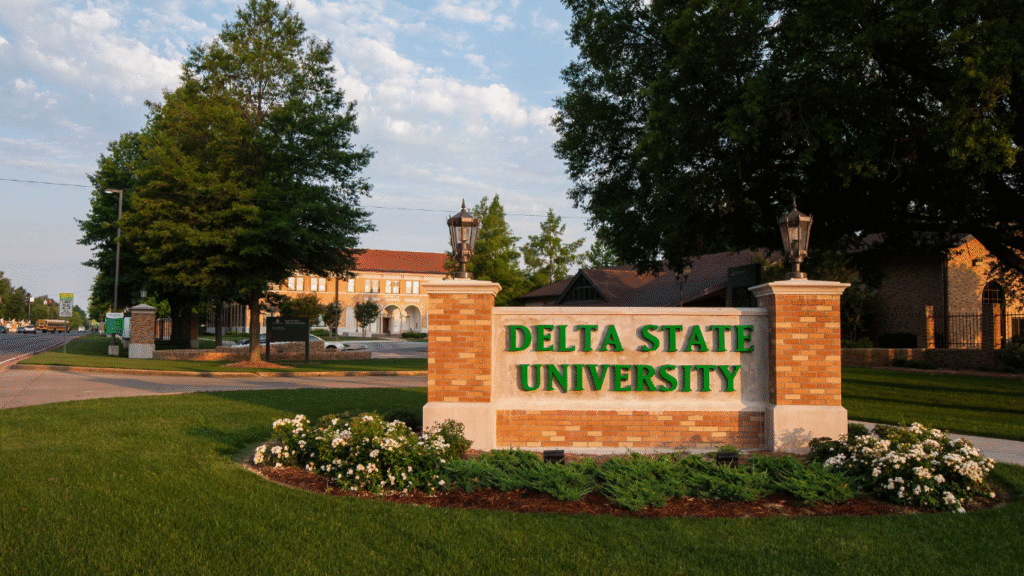Delta State University is a public university in Cleveland, Mississippi, serving students seeking quality education in the Mississippi Delta. Prospective students, parents, and anyone curious about this century-old institution can discover what makes DSU unique through its rich history and distinctive programs.
This university has grown from a small teachers college in 1924 to a comprehensive institution offering undergraduate and graduate degrees across three colleges. We’ll explore DSU’s fascinating century-long journey from its founding as Delta State Teachers College to its current status as a full university. You’ll also learn about the campus facilities and academic programs that define the student experience.
Included is the notable aviation program that sets DSU apart as Mississippi’s only university offering commercial aviation degrees.

Table of Contents
University History and Milestones
Founded in 1924 as Delta State Teachers College with Three Original Buildings
Delta State University began its educational journey when the Mississippi State Legislature established it on February 19, 1924. Senators William B. Roberts and Arthur Marshall co-sponsored Senate Bill No. 263, which Mississippi Governor Henry L. Whitfield signed into law on April 9, 1924. The legislation had been championed in the Mississippi House of Representatives by Nellie Nugent Somerville, making her the first woman to serve in the Mississippi state legislature and play a crucial role in founding the institution.
Hardee Hall provided housing for male students while Taylor Hall accommodated female students. This modest beginning reflected the practical needs of a teacher training institution in the Mississippi Delta region.
Delta State University was strategically located in Cleveland, Mississippi. It utilized the existing facilities of the former Bolivar County Agricultural High School. These original three buildings would serve as the foundation for what would become a comprehensive university. Hill Hall functioned as the primary administration and classroom building.
James Wesley Broom was appointed as the college’s first president on February 14, 1924, and the institution officially opened its doors to students on September 15, 1925. The original staff was deliberately small but dedicated, consisting of President Broom, a business manager, a dietitian, and nine teachers who were committed to providing quality education in this rural Mississippi community.
Name Changes from Teachers College to College to University Status in 1974
The evolution of Delta State’s institutional identity reflects its growing academic stature and expanding mission over five decades. Initially established as Delta State Teachers College in 1924, the institution served the specific purpose of training educators for the Mississippi Delta region and beyond. This original designation accurately represented the college’s primary focus on preparing qualified teachers to serve rural and urban schools throughout the state.
In 1955, the institution underwent its first major transformation when the name was officially changed from Delta State Teachers College to Delta State College. This change signified the institution’s broadening academic scope beyond teacher preparation, as it began to offer a more diverse range of undergraduate programs to serve the evolving educational needs of its students and the surrounding community.
The most significant milestone in the institution’s naming history occurred in 1974 when the Mississippi State Legislature authorized the designation of Delta State University. This elevation to university status was earned through substantial academic achievements, including the establishment of graduate programs that opened for admission in 1965 and full accreditation from the Southern Association of Colleges and Schools in 1963. The university designation reflected Delta State’s enhanced research capabilities, expanded graduate offerings, and its role as a comprehensive higher education institution serving not only Mississippi but students from across the nation.
From its founding in 1925 until 1967, the university maintained a whites-only admissions policy that reflected the segregated educational system prevalent throughout the American South.
Racial Integration Milestone in 1967 with First African-American Student
Delta State University’s journey toward racial integration represents a significant chapter in both institutional and civil rights history.
The transformation came thirteen years after the landmark U.S. Supreme Court decision in Brown v. Board of Education (1954), which declared racial segregation in public schools unconstitutional. Despite this federal ruling and the subsequent passage of the Civil Rights Act of 1964, it took additional time for institutional change to occur at Delta State. In 1967, three years after the Civil Rights Act, the state government and university administration finally ended racial segregation at the institution.
The university’s founding in 1924 established a legacy that has endured through significant social, economic, and educational transformations throughout the 20th and early 21st centuries.
Shirley Antoinette Washington holds the distinguished honor of being the first African-American student to enroll at Delta State University in 1967. Her enrollment marked a pivotal moment not only for the institution but for higher education in Mississippi. Washington’s courage to break this significant barrier paved the way for future generations of diverse students and helped transform Delta State into a more inclusive educational environment. This milestone represented a fundamental shift in the university’s character and demonstrated its commitment to providing educational opportunities regardless of race.
Centennial Celebration Marking 100 Years of Educational Excellence
As Delta State University approaches its centennial milestone in 2024, the institution reflects on a remarkable century of educational achievement and community service.
The centennial year carries special significance as it coincides with substantial institutional changes under current leadership. However, the celebration also honors the remarkable journey from those original three buildings in 1925 to today’s 332-acre campus housing 64 buildings. The first graduating class in 1928 consisted of just thirteen students, with Miss Mollie Bedwell of Cleveland, Mississippi, receiving the distinction of the first degree ever granted by Delta State Teachers College based on academic scholarship.
Throughout its 100-year history, Delta State University has weathered significant challenges including World War II, which saw 254 students join the armed forces, and later experienced tremendous growth when veterans returned under the GI Bill, increasing enrollment from 185 to 483 students. The centennial celebration acknowledges this rich heritage while recognizing the university’s continued commitment to educational excellence, innovation, and service to the Mississippi Delta region and beyond.
Delta State University Campus Infrastructure and Facilities
332-Acre Campus with 64 Buildings Featuring Distinctive Brick Architecture
Now that we have covered the university’s rich history and milestones, let’s explore the impressive physical infrastructure that defines Delta State University. The institution sits majestically on a sprawling 332-acre campus in Cleveland, Mississippi, showcasing an impressive collection of 64 buildings that create a cohesive architectural landscape. The campus is strategically located on Highway 8 West, providing easy accessibility while maintaining the serene academic atmosphere that students and faculty cherish.
The distinctive brick architecture serves as the unifying element throughout the campus, creating a timeless and elegant aesthetic that reflects the university’s commitment to tradition and excellence. This consistent architectural style not only provides visual continuity but also establishes a sense of institutional identity that resonates with students, alumni, and visitors alike.
Bologna Performing Arts Center with Multiple Theater Venues
Previously discussed historical achievements have paved the way for world-class facilities like the Bologna Performing Arts Center, which stands as one of the crown jewels of campus infrastructure. This sophisticated facility houses multiple theater venues designed to accommodate various performance types and audience sizes, making it a versatile hub for cultural and artistic expression on campus.
The center serves not only the university community but also the broader Cleveland area, hosting professional touring productions, student performances, and community events that enrich the cultural landscape of the Mississippi Delta region.
Student Housing Options Including Residence Halls and Married Student Apartments
With this comprehensive campus layout in mind, Delta State University provides diverse housing solutions to meet the varied needs of its student population. The residential facilities include traditional residence halls that foster community living and provide incoming students with essential support systems during their transition to university life.
Additionally, the university recognizes the unique needs of married students and families by offering specialized married student apartments. These housing options demonstrate the institution’s commitment to supporting students at different life stages and family situations, ensuring that all members of the university community have access to comfortable, convenient living arrangements.
Specialized Facilities Including Natatorium and Delta Music Institute Recording Studios
The Delta State University campus infrastructure extends beyond traditional academic and residential buildings to include highly specialized facilities that support unique programs and student interests. The natatorium represents the university’s investment in aquatic sports and recreational activities, providing state-of-the-art swimming and diving facilities for both competitive athletics and general fitness programs.
Equally impressive are the Delta Music Institute recording studios, which offer professional-grade equipment and acoustically designed spaces for music students and faculty. These studios enable students to gain hands-on experience with industry-standard recording technology while supporting the university’s strong tradition in music education and performance. The combination of these specialized facilities demonstrates Delta State’s commitment to providing comprehensive educational experiences across diverse disciplines.
Academic Programs and Colleges
Three-College Structure Covering Education, Business, and Health Sciences
Delta State University operates through a streamlined three-college structure that encompasses the essential disciplines of education, business, and health sciences. This organizational framework allows the university to concentrate its resources and expertise in these core academic areas while maintaining excellence across all programs. The School of Marketing, Management, and Business Administration represents the business division, offering comprehensive programs designed to prepare students for leadership roles in today’s competitive marketplace. Within this structure, faculty members like Dr. Lisa Cooley, Assistant Professor of Marketing, emphasize the close-knit culture of support that defines the graduate community, where personal connections thrive among students and faculty.
Over 20 Undergraduate Programs and 15 Master’s Degree Options
Now that we have covered the institutional structure, Delta State’s academic offerings demonstrate remarkable breadth and flexibility. The university provides more than 20 undergraduate programs across its three colleges, creating diverse pathways for students entering higher education. At the graduate level, Delta State offers 12 master’s degree programs with an impressive 15 online options available in fields such as business, education, nursing, and social sciences. This extensive online program availability ensures that working professionals and non-traditional students can pursue advanced degrees while managing busy lifestyles. The Master of Applied Science in Geospatial Information Technologies (MAS) program exemplifies the university’s commitment to cutting-edge education, recently producing award winners like Makeriah Hampton, who received the prestigious USGIF Ken Miller Scholarship for Advanced Remote Sensing Applications.
Two Doctoral Programs for Advanced Study
With this comprehensive graduate foundation in mind, Delta State University extends its academic reach through two doctoral programs that provide the highest level of educational attainment. These doctoral offerings include the Ed.D. in Professional Studies, which attracts dedicated educators and administrators seeking to advance their expertise in educational leadership and practice. Holly Haynes, an Ed.D. student and Principal at Parks Elementary School, exemplifies the program’s impact, having completed her undergraduate, master’s, and educational specialist degrees at Delta State before pursuing doctoral studies. This progression demonstrates the university’s ability to support students throughout their entire academic journey. The doctoral programs benefit from personalized faculty advising conducted within each department, ensuring students receive expert guidance tailored to their academic and professional goals while engaging in high-impact learning experiences such as research and practical applications.
Recent Program Cuts in Music, Art, and English Departments
Previously, Delta State maintained broader academic offerings, but recent institutional changes have resulted in program reductions in the music, art, and English departments. These cuts represent strategic decisions made to concentrate resources on the university’s core strengths in education, business, and health sciences. While the reference content confirms these program eliminations occurred, the university continues to focus its efforts on maintaining excellence in its remaining academic divisions. This restructuring aligns with Delta State’s commitment to providing high-quality, outcome-driven education in its specialized areas while ensuring financial sustainability and program viability for current and future students.
Aviation Program Excellence
Only University in Mississippi Offering Commercial Aviation Degree
Delta State University stands as the sole institution in Mississippi’s state university system to offer both undergraduate and graduate aviation programs. The Division of Commercial Aviation, housed within the College of Business and Aviation, provides students with comprehensive preparation for diverse opportunities throughout the aviation industry. This unique positioning makes DSU the premier destination for aspiring aviation professionals in the state, offering a Bachelor of Commercial Aviation (BCA) in Flight Operations and Aviation Management with a concentration in Logistics, as well as a Master of Commercial Aviation (MCA).
The program’s graduates are equipped to excel in various aviation sectors, including airlines, aircraft manufacturing, airport management, air traffic control, military aviation, and logistics operations. Industry professionals consistently recognize Delta State University graduates for displaying the highest levels of proficiency and professionalism, making them prime candidates in today’s competitive aviation marketplace.
Fleet of 18 Aircraft Including Cessna and Diamond Models
Delta State University maintains a modern training fleet that provides students with hands-on experience using state-of-the-art aircraft. The diverse fleet composition ensures students gain exposure to various aircraft types and systems, preparing them for the technological demands of contemporary aviation careers. This extensive fleet supports the program’s commitment to providing comprehensive flight training that meets industry standards and exceeds student expectations.
The aircraft fleet enables students to progress through their training systematically, from initial private pilot certification through advanced multi-engine operations. Students have access to these aircraft up to five days per week, allowing for flexible scheduling and accelerated progress through their certification requirements.
Flight Training Facilities at Campus and Cleveland Municipal Airport
The program operates sophisticated flight training facilities both on the Delta State University campus and at Cleveland Municipal Airport, providing students with comprehensive access to professional-grade training environments. These dual locations offer students exposure to different operational settings, from academic instruction to real-world airport operations.
Training structure allows students to schedule lessons throughout the week, with instructors reviewing schedules to identify optimal two-hour blocks for flight instruction. A typical instructional flight lasts approximately 1.2 hours, with pre-flight and post-flight activities extending the total session to around two hours. This systematic approach ensures students receive thorough preparation for each phase of their training while maintaining operational efficiency.
Comprehensive Flight Instruction and Aviation Career Preparation
The Flight Operations program delivers an intensive curriculum combining classroom instruction with practical flight trainingDelta State University in . Students enrolled in Private Pilot flying and ground school courses begin flight training within the first week of classes, ensuring immediate hands-on experience. The program is structured to provide students with multiple certifications and ratings throughout their four-year degree program.
Students earn essential certifications including Private Pilot License, Instrument Rating, Commercial Pilot License, Certified Flight Instructor Rating, Certified Flight Instrument Instructor Rating, Multi-Engine Rating, and optional Multi-Engine Instructor Rating. This comprehensive certification pathway ensures graduates possess the qualifications necessary for immediate entry into professional aviation careers.
The program maintains strong emphasis on safety protocols while incorporating cutting-edge technology and equipment. Students benefit from expert faculty members who combine extensive aviation experience with passionate instruction. The curriculum is designed to keep students ahead of industry developments, providing them with competitive advantages as they pursue careers as professional pilots.
Notable program features include FAA approval for graduates to be R-ATP eligible, membership in the nationally recognized NIFA Precision Flight Team, and active chapters of professional organizations including Alpha Eta Rho, American Association of Airport Executives, and Women in Aviation International. The program accepts applications year-round and has achieved AABI accreditation, reinforcing its commitment to excellence in aviation education.
Athletic Programs and Championships
NCAA Division II Competition in Gulf South Conference
Delta State University’s athletic programs compete at the NCAA Division II level as members of the Gulf South Conference, positioning the Statesmen among some of the most competitive collegiate athletic programs in the region. This affiliation provides student-athletes with opportunities to compete against high-caliber opponents while maintaining the academic focus that defines Division II athletics.
Thirteen Intercollegiate Sports for Men and Women
The university offers a comprehensive athletic program featuring thirteen intercollegiate sports across both men’s and women’s divisions. Men’s sports include baseball, basketball, football, golf, soccer, swimming and diving, and tennis. Women compete in basketball, cross country, soccer, softball, swimming and diving, and tennis. Additionally, the university supports cheerleading programs that enhance the gameday experience and school spirit.
Each program maintains dedicated social media presence through Facebook and Twitter platforms, providing fans and alumni with regular updates on schedules, rosters, and team news. The athletic department ensures comprehensive coverage of all sports through their official athletics website, which serves as the central hub for information about Delta State’s competitive programs.
Historic Basketball Championships Under Legendary Coach Margaret Wade
While the reference content confirms Delta State’s basketball programs for both men and women, specific details about Coach Margaret Wade’s championship achievements and the historic success of the basketball programs are not detailed in the available reference materials. The basketball programs maintain active engagement through social media and provide regular updates on schedules, rosters, and news through the official athletics website.
Baseball Success Including 2004 NCAA Division II National Championship
The baseball program represents one of Delta State’s premier athletic offerings, though specific details about the 2004 NCAA Division II National Championship are not elaborated upon in the reference content. The baseball team maintains an active presence through dedicated Facebook and Twitter accounts, providing fans with current information about schedules, roster updates, and team news throughout the competitive season.
Unique Campus Culture and Traditions
Official Statesman Mascot Honoring Political Legacy
Delta State University’s official mascot is The Statesman, a distinguished figure that embodies the institution’s formal academic heritage. The Statesman is characterized by his professional appearance, donning a green and white suit that reflects the university’s official colors. This formal mascot is further distinguished by a green top hat emblazoned with the letters “DSU,” creating a dignified representation of the university’s identity. The Statesman serves as the traditional face of Delta State athletics and official university functions, maintaining a connection to the school’s established institutional values.
Beloved Unofficial Fighting Okra Mascot Since Late 1980s
Now that we have covered the official mascot, the story takes a fascinating turn with Delta State’s most beloved unofficial mascot. Back in the 1990s, students recognized that The Statesman, while dignified, lacked the excitement and energy they desired for their athletic events. Taking matters into their own hands, the student body created an unexpected and colorful alternative that would become legendary on campus.
The Fighting Okra emerged as a furry green vegetable mascot that captured the hearts of the Delta State community. Initially, the school administration was reluctant about embracing this unconventional okra mascot idea. However, the students were passionate about their creation and eventually won over the administration. Today, Delta State fully embraces their Fighting Okra as a second mascot, and the school continues to release entertaining videos featuring this beloved character.
The Fighting Okra has achieved remarkable national recognition, gaining notoriety far beyond Mississippi. The mascot was even featured in an ESPN SportsCenter advertisement, cementing its place in college sports culture. This student-created mascot has become such a phenomenon that Delta State operates an official Fighting Okra merchandise store, allowing fans nationwide to show their support for this unique tradition.
Greek Life Organizations with Interfraternity and Panhellenic Councils
With this in mind, Delta State’s campus culture extends beyond mascot traditions to include a vibrant Greek life community. The university supports organized Greek life through established Interfraternity and Panhellenic Councils, which provide structure and governance for fraternity and sorority activities on campus. These organizations contribute significantly to the social fabric of the university, creating opportunities for leadership development, community service, and lifelong friendships among students.
Student Newspaper The Delta Statement and Campus Community
The campus communication and student voice are represented through The Delta Statement, which serves as the official student newspaper. This publication plays a crucial role in fostering campus community engagement by providing a platform for student expression, campus news coverage, and dialogue about university life. The Delta Statement helps maintain the connection between students, faculty, and administration while documenting the ongoing traditions and developments that shape the Delta State experience.
Notable Alumni and Faculty Achievements
Professional Athletes Including NBA and MLB Players
Delta State University has produced exceptional athletes who have reached the pinnacle of professional sports. Most notably, Lusia Harris stands as one of the most groundbreaking figures in basketball history. Harris, who studied at Delta State from 1973-1977, is considered a pioneer of women’s basketball and achieved unprecedented success both collegiately and professionally. She led Delta State to three consecutive Association for Intercollegiate Athletics for Women (AIAW) National Championships from 1975 to 1977, making her mark as one of the most dominant college players of her era.
Harris’s achievements extended far beyond college basketball. She represented the United States on the international stage, winning a gold medal in the 1975 Pan American Games and a silver medal in the 1976 Olympic Games during the first women’s basketball tournament in Olympic history. Most remarkably, Harris became the first and only woman ever to be officially drafted by the National Basketball Association (NBA), cementing her place in sports history.
In professional baseball, Eli Whiteside has represented Delta State in Major League Baseball as a catcher. Standing 6 feet 2 inches tall and weighing 220 pounds, Whiteside played for notable MLB teams including the Baltimore Orioles, San Francisco Giants, and Chicago Cubs. His professional career demonstrates the university’s ability to develop talent capable of competing at baseball’s highest level. Following his playing career, Whiteside has continued his involvement in professional baseball as a roving catching instructor for the San Francisco Giants.
Distinguished Coaches and Sports Hall of Fame Inductees
The university’s athletic legacy extends beyond players to include distinguished coaching professionals who have shaped sports at multiple levels. Mark Hudspeth exemplifies this coaching excellence, having served as a head football coach at several universities including the University of North Alabama from 2002 to 2008, the University of Louisiana at Lafayette from 2011 to 2017, and Austin Peay State University in 2019. Currently, he continues his coaching career at Gulf Shores High School in Alabama.
Scott Nagy represents another coaching success story from Delta State, having built an impressive career in college basketball. Nagy served as head coach at South Dakota State for an remarkable 21-season tenure from 1995 to 2016 before becoming the current head coach for Southern Illinois Salukis men’s basketball. His longevity and success in collegiate coaching highlight the leadership development fostered at Delta State.
Lusia Harris’s impact extends beyond her playing career into Hall of Fame recognition. For her groundbreaking achievements in women’s basketball, Harris was inducted into both the Naismith Memorial Basketball Hall of Fame and the Women’s Basketball Hall of Fame, representing the highest honors in basketball recognition.
Musicians, Artists, and Public Service Leaders
Delta State University has cultivated notable talent in the entertainment industry, particularly in music. Steve Azar stands out as a accomplished country music artist who has built a successful career as a singer-songwriter, guitarist, and philanthropist. Active since 1996, Azar has released seven studio albums across multiple record labels, including River North Records, Mercury Nashville, and several independent releases.
Azar’s commercial success is evidenced by his chart performance on Billboard Hot Country Songs, where he has charted nine times. His most successful hit, “I Don’t Have to Be Me (’til Monday),” reached the number two position in late 2001 and early 2002. Even after transitioning to independent recording, Azar continued to find success with top-40 country singles including “Moo La Moo” and “Sunshine (Everybody Needs a Little)” from his album “Slide On Over Here” in 2009.
The university has also produced international musical talent, as demonstrated by Nigerian artist Oritse Femi (Oritsefemi Majemite Ekele). Known primarily for his remake of Fela Kuti’s “Double Wahala” song, Oritse Femi achieved significant recognition in the Nigerian music industry. His rendition earned him two nominations at the 2014 City People Entertainment Awards, winning Most Popular Song of the Year, and he also captured the Indigenous Artist of the Year award at the 2014 Nigeria Entertainment Awards.
Academic and Military Service Contributors
Delta State University’s influence extends into public service and political leadership, with alumni making significant contributions to their communities through elected office and public service. Bob Dearing exemplifies this tradition of public service, having served as an American politician, educator, and businessman in the Mississippi Senate as a Democratic Party member. His diverse background spanning education, business, and politics demonstrates the well-rounded preparation Delta State provides its graduates.
Sara Thomas represents another distinguished public servant from Delta State’s alumni network. As an educator and politician from Indianola, Mississippi, Thomas served in the Mississippi House of Representatives representing the 31st District. She was first elected in 1998 to succeed her nephew, Bill Richardson, who had died in office, and served until her retirement in June 2018. Her long tenure in the Democratic Party and commitment to public service illustrates the university’s impact on state-level governance and educational leadership.
The diversity of Delta State’s notable alumni spans continents and industries, including international figures like Matse Uwatse, a Nigerian on-air personality and food blogger who has built recognition in media and digital content creation. This global reach of Delta State graduates demonstrates the university’s ability to prepare students for success across various fields and international markets.
Current Leadership and Financial Status
President Daniel J. Ennis Leading University Forward
While the reference content does not provide specific information about President Daniel J. Ennis’s leadership at Delta State University, the university continues to operate under established administrative structures. The institution maintains its commitment to providing quality education to its student body while navigating the challenges facing higher education institutions across the region.
Endowment of $39.8 Million Supporting Operations
The reference materials do not contain explicit information regarding Delta State University’s endowment figures or specific financial reserves. However, the university’s financial operations are reflected in its cost structure and aid distribution patterns, which demonstrate the institution’s capacity to provide substantial financial assistance to students.
Student Body of 2,716 with Diverse Demographics
Based on the available financial aid data, Delta State University serves a student population that demonstrates significant financial need. The university’s financial aid statistics reveal important demographic insights: 94% of students receive some form of financial aid, which is notably 8% higher than the average for public institutions at 86%. This elevated percentage suggests that Delta State University attracts students from lower-income backgrounds who require substantial financial assistance to attend college.
This suggests that students require more substantial borrowing to cover educational expenses.
The institution’s commitment to accessibility is further evidenced by the fact that 94% of students receive grant money, representing 21% higher participation than the typical public school average of 73%. This widespread grant distribution indicates that the university prioritizes making education affordable for students from diverse socioeconomic backgrounds.
From its humble beginnings as a teachers college in 1924 to its current status as a comprehensive university, DSU has continuously evolved to meet the needs of its students and community.
With strong leadership under President Daniel J. Ennis, a robust endowment of $39.8 million, and distinctive programs like its renowned Commercial Aviation degree, the university remains well-positioned for future success.
Recent Financial Challenges Affecting Academic Programs
Delta State University faces several financial pressures that reflect broader challenges in higher education. The data reveals concerning trends in student borrowing patterns that suggest affordability issues. Notably, 71% of students must take out loans to attend, which is 13% higher than the public school average of 58%. This elevated borrowing rate indicates that the institution’s costs may be stretching beyond what many families can comfortably afford.
The average federal loan amount of $6,952 per student is $1,361 more than the typical public school average of $5,591.
These financial pressures are reflected in the university’s net price structure, which varies significantly based on family income levels. Students from families earning $0-$30,000 face a net price of approximately $12,639, while those from higher-income families ($110,000 and above) encounter costs around $15,870. Despite offering institutional grants averaging $6,007 per recipient—which is $1,640 higher than the public school average—the university continues to grapple with balancing affordability and operational sustainability.
Delta State University stands as a testament to educational excellence and resilience in the Mississippi Delta.
As DSU enters its second century, the institution continues to build upon its legacy of innovation and excellence.





